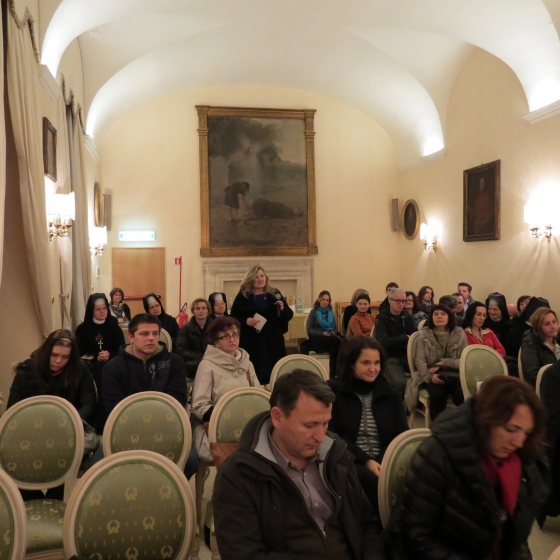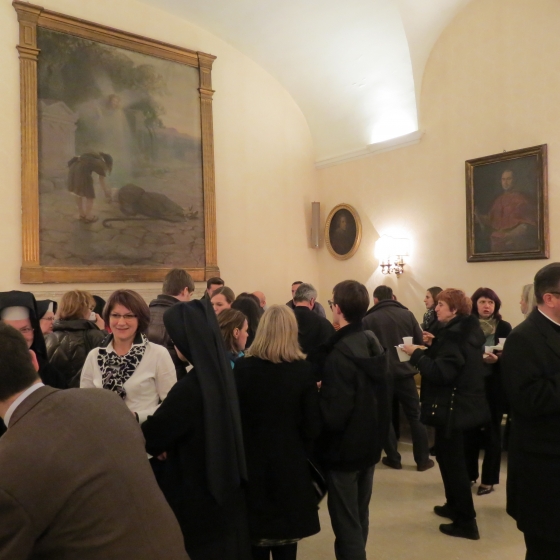The teaching of the Second Vatican Council on Revelation and the meaning of the Word of God in Christian life were discussed during the evening of March 2nd, 2014 in the Eternal City at the subsequent meeting from the cycle ‘The Second Vatican Council as a Compass of the New Evangelization’. The meeting was organized by the John Paul II Pontificate’s Center for Documentation and Research and by the Chaplaincy of the Polish church St. Stanislaus Bishop and Martyr in Rome.
Rev. Dr. Andrzej Dobrzyński presented a historical outline of the shaping of theology in the Post-Reformation period in the 16th century that had showed the Bible and tradition as two different sources of Revelation. This outline demonstrated that the Holy Scripture was not given prime importance in theology, preaching, and pastoral ministry and, in turn, also did not foster the development of biblical studies. Protestant theologians attempted using secular sciences; because of this they often lost the perspective of Christian faith in their approach to the Bible. The biblical movement, developing in the first half of the 20th century in the Catholic Church, showed a need for the development of biblical studies and for the harmonization of their achievements with the Magisterium of the Church and with the spiritual life of the faithful.
The Second Vatican Council in its constitution ‘Dei Verbum’ teaches that the source of Revelation is God alone who expressed the saving truth in words and deeds and put it in the Holy Scripture and in the living tradition of the Church. In Christ, who is the fullness and the center of Revelation, God invited man to a friendship with Him. The faith is a conscious and voluntary answer of man given in the community of the whole Church in which the Holy Spirit is operating. The Magisterium of the Church watches over whether the truth of God is being preserved and transmitted in an integral way. The Council document, although very short, is rich in theological content. It includes suggestions not only for theologians but also for pastoral ministers and lay faithful, because everyone should learn the revealed truths, especially by reading the Scriptures. It was rightly pointed out by John Paul II that the fruit of the Council teaching was the fact that the Word of God, to a greater extent and more than it was before, became a criterion for the evangelization of personal and ecclesiastical life, and of ecumenism.
Rev. Fr. Prof. Zdzisław Kijas OFM Conv underlined that the new evangelization is meant to give a voice to the Gospel itself and not to human sciences and words. For Christians the Bible is a unique book to which all the other books are just a sort of comment. Not only our deeds but also the knowledge we acquire should be confronted with the word of the Lord. The word of God written in the Bible is transmitted in the teaching of the Church. But today we have to be very sensitive in formulating the criticism. We should be aware whether this critique is aimed as a thoughtful message from the pulpit made by a single priest or it concerns the truth taught by the Church that results from Revelation and which we should accept on the basis of being obedient to our faith.
Fr. Kijas spoke about various ways of approaching the Bible, about attaining a special bond with it. Referring to the statements of Roman Brandstaetter, he stressed that it is not so important to understand everything but rather to ‘remember’ to make the words of the Scriptures ‘an anchor’ of our faith and hope. The theologian also noticed that the Bible talks about God who is hidden in the words of Scripture and is revealing Himself to the one who reads them. However the Bible says no less of man. The Holy Scripture ‘is not ashamed with that what is human’, because there is a lot of human weakness in it. But the Scripture remains above all a book of hope and shows the life of man reborn in Christ. The word of God is the light for our life and is leading us to the final encounter with God in eternity.
This meeting of the Polish community in Rome was a reminder that we still should mobilize ourselves towards a better understanding of Holy Scripture and to the recognition: how the revealed truths from the pages of this book are living in the Church and how they are taught and passed on to future generations. The Church – Benedict XVI taught – is a community listening to the word of God, because she could not be alive alone, it is the Gospel that nourishes her and regenerates her. Similarly in man’s personal life, only those who listen to the word of God, takes it to his or her heart and puts it into practice, can be its preacher.
